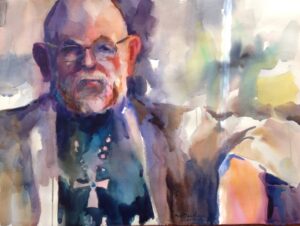This is a meditation on the story of Zacchaeus. The “Little man”, “Short man”, or Napoleon Complex, is an unscientific observation. Yet common enough in popular culture to be observed by many. It refers to men who are somewhat less than 5’9” who seem by others to try harder to compensate for their short statue. My favorite well known short guy is Danny DeVito, the famous actor of TV and movies. He made his stature an asset. Should they make a movie about Zacchaeus, Danny should get the part!
On of my favorite college professors wasn’t much taller than DeVeto. I thought him a wise and brilliant man as well as a superior educator. Aside from more serious subjects he also taught a course in golf. Some of the male students would make fun of him behind his back by lifting a golf club as if it was a bar bell weighing 300lbs!
This is how I see Zacchaeus. He is a man of means. He has risen to the top of his profession as a tax collector; a classic over achiever. He has not let collaboration with the authorities or the hated Romans nor his stature get in the way of becoming successful and rich.
However, based upon his behavior in this story we assume he had a desperate need to find some kind of acceptance and healing for the emptiness he carried due to the isolation from his neighbors.
When he hears that Jesus has come to his village he knows that it will be impossible to get to the front of the crowd. Nevertheless, he decides that he must at least see this holy man. Without a care for dignity like some young boy he climbs a tree to get a better look. Imagine how humorous he must have looked up there dressed in his fine clothes!
There Jesus sees him, and recognizes the desperation in his actions. Then to the surprise of the crowd and the delight of the little man Jesus approaches the tree. Looking up, (and not looking down on him!) Jesus invites himself to Zacchaeus’ house for dinner!
In that culture sharing a meal with someone was a bonding experience. Breaking bread together is a symbol of friendship and acceptance. The crowd is indignant because of Jesus’s acceptance. Zacchaeus, on the other hand is touched to the core so much that he repents of his past manipulations of taxes. He spontaneously pledges to right all his wrongs by distributing half his wealth to the poor and repaying any he has cheated 4 times we he had stolen!
Jesus tells the crowd, “Today, salvation has come to this house!”
Perhaps the most important lesson of this event is this: kindness, and acceptance are more effective for repentance than judgement and rejection! As a participant in KAIROS prison ministry I have witnessed this many times. The statistics bear the truth. The now retired chaplain at the state prison where I volunteer kept a record. The average recidivism rate ( how many prisoners return to prison once out) was 85%. For participants in KAIROS it is less than 8%! A study done in South Carolina is even better 3 1/2%.
The ministry motto says it well: Listen, Listen, Love Love! This is acceptance. There is no pressured altar call. Instead through talks, acts of love, and many opportunities for the “residents” to speak and be heard most come to accept “Friendship with God.”
Another lesson in these events is the truth of obvious desperation exhibited by Zacchaeus. There is a wise say in AA and other 12Step programs. Addicts don’t seek help until they hit a bottom where the pain they are in is worse than the pain of getting better! If we could have seen Zacchaeus’ face at the bottom of the tree before the climb we would have seen his pain. Certainly Jesus saw it and responded.
The next lesson is about restitution. 12 Step programs call it “making amends.” Repentance is not just feeling bad or sorry. It is making a 180 in behavior. For Zacchaeus it meant giving and sharing instead of taking and hoarding.
Questions for contemplation!
What disabilities have influenced the path of your life?
What “tree” would you climb to get a closer look at Jesus?
Is Jesus your friend; are you his?
Is there any reason for you to repent?
